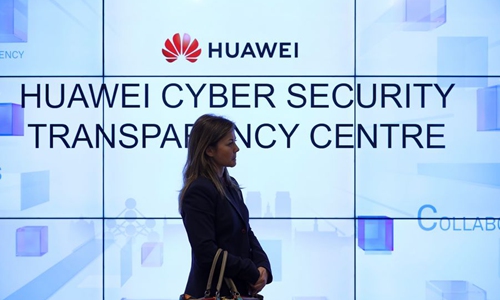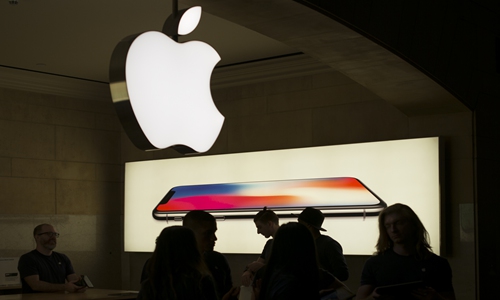HOME >> CHINA
China to beat back US' tech 'hegemony'
By Wang Cong Source:Global Times Published: 2020/4/3 0:13:40 Last Updated: 2020/4/3 16:19:30
US handing tech edge to Beijing by seeking political correctness

A woman listens to a debate at Huawei Cyber Security Transparency Center in Brussels, Belgium, on Jan. 30, 2020.(Xinhua/Zhang Cheng)
The renewed tension in the technology sector adds fresh fire to widening clashes between the world's two biggest economies over a wide range of areas in wake of the coronavirus pandemic, which has emboldened some anti-China and anti-globalization forces in the US in their ill attempts to decouple from China, Chinese analysts said on Thursday.
However, these forces might have picked the wrong approach, as China will strike back and could hit the US technology sector ten times harder than what the US could hurt China, given its growing technological capabilities and massive market, the analysts noted, adding that while the tensions will likely persist and cause short-term disruptions, they won't be the overall trend of global technological collaboration.
China strikes back
Commenting on Washington's recent move against Chinese telecom firm Huawei on Thursday, Hua Chunying, a spokesperson for the Chinese Foreign Ministry, said that China would retaliate if the US follows through. "For this type of US technology hegemony, the Chinese government will definitely not sit idly by," Hua told a routine press briefing.
The US was preparing for further measures against Huawei, aiming to block sales of chips to the company by Taiwan Semiconductor Manufacturing Co, a major supplier for Huawei, according to media reports earlier this week. The move, if followed through, could cause serious disruptions to Huawei's operations, but the move isn't life-threatening as alternative suppliers remain, analysts said.
Hua's comments also came as some US officials are escalating the tech war with China. Some senior US officials have been mulling new hurdles for stopping US companies from selling certain high-tech products to Chinese companies that could be diverted for military use, including semiconductors, citing China's military-civilian integration development plan, Reuters reported on Thursday. Hua pushed back at the claims, pointing out that many large US companies are also the result of military-civilian integration drive.
"This is a desperate move from the US after its multi-year campaign against Huawei failed. It does not make any sense because this will hurt US companies just as much as it hurts Chinese companies, if not more. But then again, the US has lost sensibility on a lot of things," Xiang Ligang, a veteran telecom industry analyst in Beijing, told the Global Times on Thursday.
While Chinese officials did not specify potential countermeasures against the US, analysts said there are plenty options in China's toolbox, even more than during the trade war, mainly because many US tech firms from plane manufacturer Boeing to chipmaker Intel to smartphone producer Apple, are all exposed to the Chinese market. China accounts for over 22 percent of Boeing's commercial revenue, 28 percent for Intel and about 15 percent for Apple, media reports showed.
In total, US tech companies generate a total of about $600 billion revenue from the Chinese market each year, while Chinese companies only get less than one-tenth of that from the US, according to Fang Xingdong, founder of Beijing-based technology think tank ChinaLabs.
"If US politicians are really imbecilic and fight a tech war, it will be a simple and easy thing for China to retaliate. China and the US might both have advantages in a trade war, but in technology, China's strength could be a few times more powerful than that of the US," Fang told the Global Times on Thursday.
US high-tech companies rely on China for sales revenue but also crucial components, Fang said. "Without the support of China's supply chain, production at a majority of US companies will go into shock immediately," he said.
Some US businesses have voiced concerns about how the new restrictions will impact their businesses, according to Reuters. US President Donald Trump has not signed on the plan yet. Trump in February blocked an earlier attempt by some officials in his administration to block sales of US airplane engines to China.

The coronavirus outbreak has seriously affected the operation of Apple's supply chain. Photo: cnsphoto
Battle for dominance
However, despite the obvious flaws in what Chinese analysts call "self-destructive" plans, some anti-China officials within the US government, who have been relentlessly pushing for a China-US decoupling, are emboldened by supply chain problems highlighted by the pandemic, analysts noted.
The seemingly desperate measures from Washington also highlighted a deepening urgency and uneasiness among some US officials that they are already falling behind China in responding to the pandemic - an event that could reshape the world order for years to come - and they are fighting to reserve that trend by staying in the key battle over revolutionary technologies in areas such as internet, telecom, AI, and biotech, the analysts added.
However, in scrambling to contain China from rising in these areas after the pandemic, these US officials are actually helping China rather than saving themselves, Shen Yi, an associate professor of international politics at Fudan University in Shanghai.
"[Cracking down on Chinese tech companies] is most silly commercially, it also fits perfectly into the political environment of the US, where attacking China is politically correct," Shen told the Global Times on Thursday. "Put it bluntly, to just show political correctness, US officials are abandoning the foundation for its technological dominance and basically handing it to China."
For China, while the measures "might cause some trouble for some Chinese companies, but in the long run, it only boosts China's core competiveness," Shen said.
China is already among the world's leaders in a wide range of areas, including 5G, artificial intelligence (AI), big data and others and is continuing to invest in these areas. Even as it copes with the epidemic, China has stepped up spending in these areas, or what Chinese officials call "new infrastructure" projects, with a total of 40 trillion yuan investments already announced, according to some estimates.
RELATED ARTICLES:
Posted in: DIPLOMACY